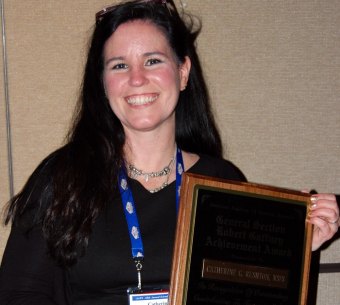The award was presented to Rushton at the academy’s 68th annual meeting held February 22-27 in Las Vegas, Nevada. She won the award for her oral presentation titled, “Multidimensional Model for Assessing Student Achievement” she delivered at the American Academy of Forensic Sciences 2015 Annual Meeting in Orlando, Florida.
The presentation provided the preliminary findings from a study Rushton conducted that was directed at creating a framework academic programs can implement to assess student achievement in forensic science education.
“The model for such a framework would provide a structure for forensic science programs to document student performance as well as demonstrate program quality and accountability to crime laboratories and the public,” she said.
Rushton said she wants to be a part of shaping the future of forensic science education.
“Through my research, I investigate ways to improve the way we teach in forensic science,” she said.
The Robert Gaffney Achievement Award is designed to promote continual professional growth in forensic science and to encourage new forensic science professionals in their occupational specialties.
It is one of three awards presented each year at the American Academy of Forensic Sciences annual meeting to members of the General Section, which includes forensic science disciplines such as forensic education or research, forensic accounting, forensic archaeology as well as forensic death and crime scene investigation.
The annual scientific meeting features professionals who present the most current information, research, and updates in forensic science. The professional organization represents the United States, Canada and 70 other countries worldwide.
Rushton has been an instructor for 19 years in the Marshall University Forensic Science Graduate Program, and she graduated in the nationally recognized program’s first class in 1997. She teaches comparative science which includes fingerprints, firearms/toolmarks and questioned documents. She also teaches forensic microscopy which includes polarized light microscopy and scanning electron microscopy for the analysis of fibers, hair, fur, soil, and minerals.
In 2015, once again the Marshall University Forensic Science Graduate Program ranked number one in the country for its students receiving the highest overall test scores compared to other graduate programs participating in the Forensic Science Assessment Test, a national assessment test offered each year by the American Board of Criminalistics. It is the sixth time in nine years that Marshall’s program ranked number one in the country on the assessment test.
